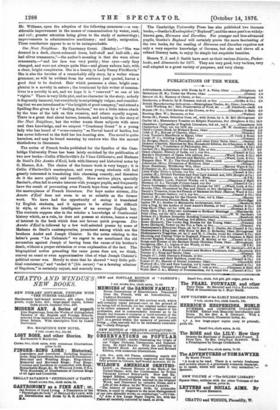The series of French books published for the Syndics of
the Cam- bridge University Press has been lately enriched by the publication of two new books—Collin d'Harleville's Le Vieux Celibataire, and Madame de Steel's Dix Annies d'Exil, both with literary and historical notes by G. Masson, B.A. The choice of the former work is very happy ; it is Collin d'Harleville's masterpiece, and even young students will feel greatly interested in translating this charming comedy, and therefore do it the more quickly and heartily. More serious plays, specially Racine's, often fail to awake interest with younger pupils, and frequently have the result of preventing even French boys from reading more of the masterpieces of French literature. For boys under sixteen, Dix Anneres d'Exil does not seem to us so suitable as the former work. We have had the opportunity of seeing it translated by English students, and it appears to be either too difficult in style, or above the intelligence of an average English boy. The contents suppose also in the scholar a knowledge of Continental history which, as a rule, he does not possess at sixteen, hence a want of interest in the book which does not favour quick progress. Dix Antares d'Exil is followed by a few well-selected poems by some of Madame de Steel's contemporaries, prominent among which are the brothers Andre and Joseph Chdnier. In the notes relating to the latter's poem "La Calomnie " we regret to see mentioned the old accusation against Joseph of having been the cause of his brother's death, without a proper refutation or even explanation of the fact. The biographical notice preceding the same poem does not, we think, convey an exact or even approximative idea of what Joseph Chtinier's political career was. Merely to state that he showed "very little poli- tical consistency," and "ended it "(his career) "as a fawning admirer of Napoleon," is certainly unjust, and scarcely true.


































 Previous page
Previous page